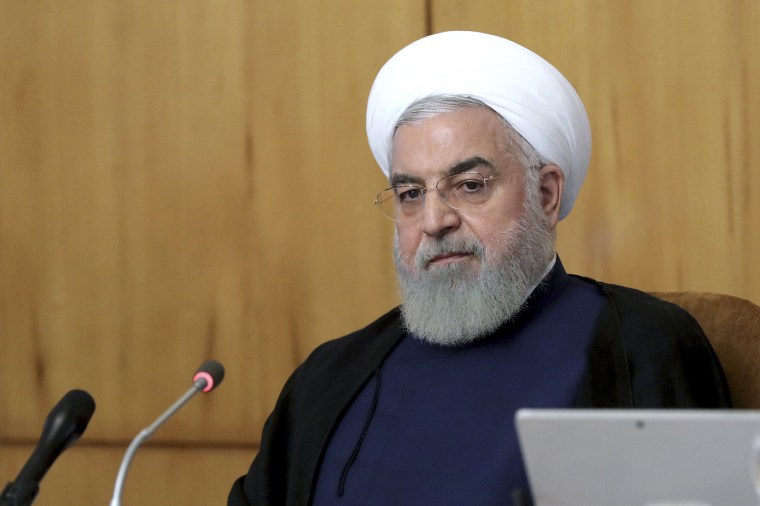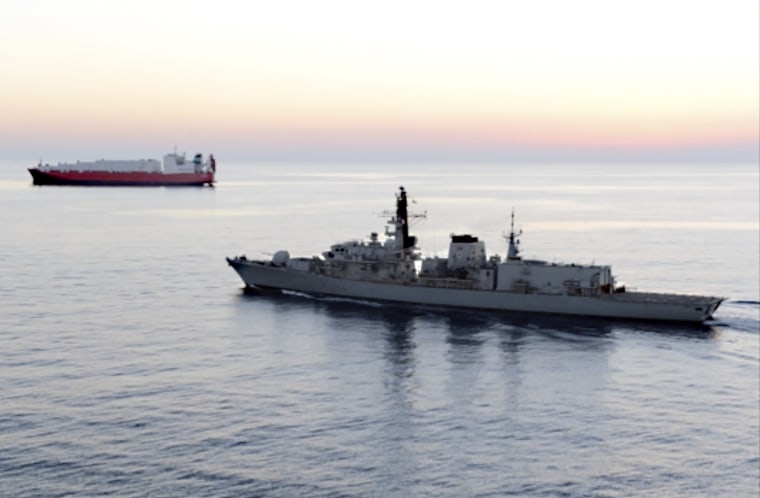LONDON — Britain’s navy announced Thursday that it will accompany British ships through the Strait of Hormuz after Iran seized one of its tankers, but experts say a diplomatic — rather than military — solution to the impasse is most likely.
Iranian commandos rappelling from a helicopter boarded a British flagged oil tanker off Iran’s coast Friday, two weeks after British forces impounded an Iranian tanker off the coast of Gibraltar, a British territory.
Iran labeled the British move “piracy,” while Britain said it had detained the Iranian ship on suspicion of attempting to supply oil to Syria, in breach of European sanctions.
“The Department for Transport has … updated its advice to confirm that the Royal Navy has been tasked to accompany British-flagged ships through the Strait of Hormuz, either individually or in groups, should sufficient notice be given of their passage,” the Ministry of Defense said in a statement.
But the move isn’t a viable long-term solution given the volume of traffic through the vital oil shipping lane and strained British naval resources, experts said.

“The options are limited. It looks like what will happen is effectively a swap of tankers,” said Peter Roberts, director of military sciences at the Royal United Services Institute think tank in London.
Iranian President Hassan Rouhani on Wednesday appeared to suggest such a resolution, telling a Cabinet meeting, "If Britain steps away from the wrong actions in Gibraltar, they will receive an appropriate response from Iran."
However, the deal is unlikely to be a straight swap, which would embarrass the European Union and the Untied Kingdom and could encourage Iran to seize other ships off its coast, which borders an important global oil shipping route.
“I think there would have to be some sort of guarantees that they weren’t able to achieve the first time they had that negotiation. Guarantees to make sure that oil didn’t go to Syria, but perhaps find a way for that oil to be sold. I think there could be some creativity,” Sanam Vakil, senior research fellow at London’s Chatham House think tank, said.
The U.S. has slapped sanctions on Iranian oil sales, but a new trading mechanism bypassing the U.S. financial system set up by European powers last month could possibly be used to facilitate the transaction, Vakil said.
The Instrument in Support of Trade Exchanges is an effort to keep Tehran in a deal aimed at curbing its nuclear activity while allowing some uranium enrichment, an agreement the U.S. withdraw from last year.
Britain and other European powers remain committed to the deal, which could be used as leverage to pressure Iran into releasing the British tanker, the Stena Impero.
“Whether the U.K. will continue to back the [nuclear deal] is really the big card the U.K. has to play,” Roberts said.
A military solution to the impasse is highly unlikely and could dramatically escalate regional tensions.
Britain has reduced its naval forces over the years and while experts suggest that British special forces are likely to be able to seize the Stena Impero, the oil tanker would be too slow to exit Iranian waters safely.
“The situation is extremely different from the '80s for example when I think the Royal Navy had over 50 destroyers and frigates, and now it has under 20,” Robert McCabe, assistant professor of maritime security at Coventry University, said.
“A team could go in and retake the ship but that only solves 5 percent of the problem. That’s a massive escalation.”
A quick negotiated solution, by contrast, could boost the foreign policy credentials of Britain’s new prime minister, Boris Johnson.
As foreign secretary, Johnson was forced to apologize after mistakenly saying Nazanin Zaghari-Ratcliffe, a British-Iranian mother detained in Iran since 2016, had been in the country training journalists.
She was visiting relatives, who said Iran had used Johnson’s comments to justify her arrest.
“I think that Boris Johnson, who’s also been to Iran, who’s had this gaffe over Nazanin Zaghari-Ratcliffe, might have more of a personal investment to make in dealing with Iran in a bilateral way,” Vakil said.
“This could be an opportunity for the new prime minister to use this crisis to bolster his leadership.”

